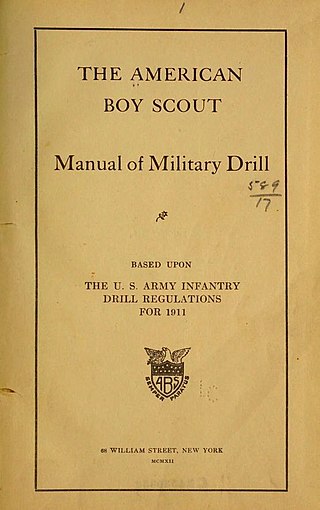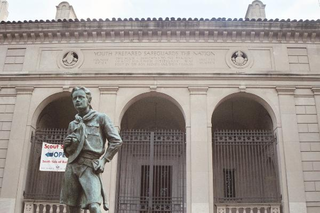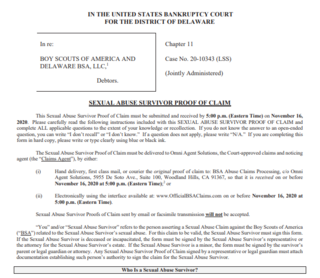
The Boy Scouts of America is one of the largest scouting organizations and one of the largest youth organizations in the United States, with over 1 million youth, including 176,000 female participants. The BSA was founded in 1910; about 130 million Americans have participated in its programs. Served by 477,000 adult volunteers. BSA became a founding member organization of the World Organization of the Scout Movement in 1922.
The Anticybersquatting Consumer Protection Act (ACPA), 15 U.S.C. § 1125(d),(passed as part of Pub. L.Tooltip Public Law 106–113 ) is a U.S. law enacted in 1999 that established a cause of action for registering, trafficking in, or using a domain name confusingly similar to, or dilutive of, a trademark or personal name. The law was designed to thwart "cybersquatters" who register Internet domain names containing trademarks with no intention of creating a legitimate web site, but instead plan to sell the domain name to the trademark owner or a third party. Critics of the ACPA complain about the non-global scope of the Act and its potential to restrict free speech, while others dispute these complaints. Before the ACPA was enacted, trademark owners relied heavily on the Federal Trademark Dilution Act (FTDA) to sue domain name registrants. The FTDA was enacted in 1995 in part with the intent to curb domain name abuses. The legislative history of the FTDA specifically mentions that trademark dilution in domain names was a matter of Congressional concern motivating the Act. Senator Leahy stated that "it is my hope that this anti-dilution statute can help stem the use of deceptive Internet addresses taken by those who are choosing marks that are associated with the products and reputations of others".

The Boy Scouts of America (BSA) use uniforms and insignia to give a Scout visibility and create a level of identity within both the unit and the community. The uniform is used to promote equality while showing individual achievement. While all uniforms are similar in basic design, they do vary in color and detail to identify the different membership divisions of Cub Scouting, Scouts BSA and Venturing. Many people collect BSA insignia such as camporee and jamboree emblems, council shoulder strips and historical badges.
Leo D. Stoller is an American self-styled "intellectual property entrepreneur" based in suburban Chicago, Illinois. Stoller claimed rights to a large inventory of well-known trademarks and engaged in the assertive enforcement of those alleged trademark rights, threatening infringement action against people and companies who attempt to use similar marks.

The American Boy Scouts (ABS), later the United States Boy Scouts, was an early American Scouting organization formed by William Randolph Hearst in 1910, following on from the formation of the Scouting movement by Robert Baden-Powell between 1903 and 1907. Near the end of its existence, the organization also used the names American Cadets and U.S. Junior Military Forces.
A colour trade mark or color trademark is a non-conventional trade mark where at least one colour is used to perform the trade mark function of uniquely identifying the commercial origin of products or services.
The Boy Scouts of America (BSA), one of the largest private youth organizations in the United States, has policies which prohibit those who are not willing to subscribe to the BSA's Declaration of Religious Principle, which has been interpreted by some as banning atheists, and, until January 2014, prohibited all "known or avowed homosexuals", from membership in its Scouting program. The ban on adults who are "open or avowed homosexuals" from leadership positions was lifted in July 2015.
The Trademark Trial and Appeal Board (TTAB) is an administrative tribunal within the United States Patent and Trademark Office (USPTO). The TTAB is empowered to determine the right to register a trademark. It has no authority to determine the right to use one, nor broader questions of infringement, unfair competition, damages or injunctive relief. The TTAB decides ex parte appeals from decisions by USPTO Examiners denying registration of marks, and inter partes proceedings challenging the registration of marks. Decisions of the TTAB may be appealed to a United States district court, or to the United States Court of Appeals for the Federal Circuit.

Pro-Football, Inc. v. Harjo, 415 F.3d 44, is a case in which the U.S. Court of Appeals for the District of Columbia considered the decision of the United States Patent and Trademark Office's Trademark Trial and Appeal Board (TTAB) to cancel the registration of the Washington Redskins football team, based on the claim that the name was disparaging to Native Americans. The Court of Appeals did not actually reach the merits of the TTAB's decision; it sent the case back to the trial court for consideration of a procedural issue.
Browder v. Gayle, 142 F. Supp. 707 (1956), was a case heard before a three-judge panel of the United States District Court for the Middle District of Alabama on Montgomery and Alabama state bus segregation laws. The panel consisted of Middle District of Alabama Judge Frank Minis Johnson, Northern District of Alabama Judge Seybourn Harris Lynne, and Fifth Circuit Court of Appeals Judge Richard Rives. The main plaintiffs in the case were Aurelia Browder, Claudette Colvin, Susie McDonald, and Mary Louise Smith. Jeanetta Reese had originally been a plaintiff in the case, but intimidation by segregationists caused her to withdraw in February. She falsely claimed she had not agreed to the lawsuit, which led to an unsuccessful attempt to disbar Fred Gray for supposedly improperly representing her.
An opposition proceeding is an administrative process available under the patent and trademark law of many jurisdictions which allows third parties to formally challenge the validity of a pending patent application, of a granted patent, or of a trademark.

Barnes-Wallace v. Boy Scouts of America was a case involving the City of San Diego's relationship with the Boy Scouts of America.

A concurrent use registration, in United States trademark law, is a federal trademark registration of the same trademark to two or more unrelated parties, with each party having a registration limited to a distinct geographic area. Such a registration is achieved by filing a concurrent use application and then prevailing in a concurrent use proceeding before the Trademark Trial and Appeal Board ("TTAB"), which is a judicial body within the United States Patent and Trademark Office ("USPTO"). A concurrent use application may be filed with respect to a trademark which is already registered or otherwise in use by another party, but may be allowed to go forward based on the assertion that the existing use can co-exist with the new registration without causing consumer confusion.

Scouting in the United States is dominated by the 1.2 million-member Boy Scouts of America and the Girl Scouts of the USA and other associations that are recognized by one of the international Scouting organizations. There are also a few smaller, independent groups that are considered to be "Scout-like" or otherwise Scouting related.

The Boy Scouts of America (BSA) was inspired by and modeled on The Boy Scouts Association, established by Robert Baden-Powell in Britain in 1908. In the early 1900s, several youth organizations were active, and many became part of the BSA.

The doctrine of foreign equivalents is a rule applied in United States trademark law which requires courts and the TTAB to translate foreign words in determining whether they are registrable as trademarks, or confusingly similar with existing marks. The doctrine is intended to protect consumers within the United States from confusion or deception caused by the use of terms in different languages. In some cases, a party will use a word as a mark which is either generic or merely descriptive of the goods in a foreign language, or which shares the same meaning as an existing mark to speakers of that foreign language.

The Boy Scouts of America (BSA) is one of the largest youth organizations in the United States, with 2.3 million youth members and approximately 889,000 adult volunteers in 2017. In 1979 there were over 5 million youths in BSA.
The Washington Redskins trademark dispute was a legal effort by Native Americans to define the term "redskin" to be an offensive and pejorative racial slur to deprive the owners of the NFL's Washington Redskins of the ability to maintain federal trademark protection for the name. These efforts had primarily been carried forward in two cases brought before the U.S. Patent and Trademark Office (USPTO). While prevailing in the most recent case in which the trademarks were cancelled, petitioners withdrew for further litigation now that the legal issue has become moot due to a decision in another case which found the relevant portion of the trademark law to be an unconstitutional infringement on freedom of speech.
Lens.com, Inc. v. 1-800 Contacts, Inc., 686 F.3d 1376, is a decision by the United States Court of Appeals for the Federal Circuit which ruled that when software merely acts as a "conduit" for providing services over the internet, and does not have an independent value per se, it does not constitute a "good" being "sold or transported in commerce" for the purposes of establishing whether or not a trademark for "computer software" has been "abandoned" under 15 U.S.C. § 1064 and 15 U.S.C. § 1127
Iancu v. Brunetti, No. 18–302, 588 U.S. ___ (2019), is a Supreme Court of the United States case related to the registration of trademarks under the Lanham Act. It decided 6–3 that the provisions of the Lanham Act prohibiting registration of trademarks of "immoral" or "scandalous" matter is unconstitutional by permitting the United States Patent & Trademark Office to engage in viewpoint discrimination, which violates the Free Speech Clause of the First Amendment.








